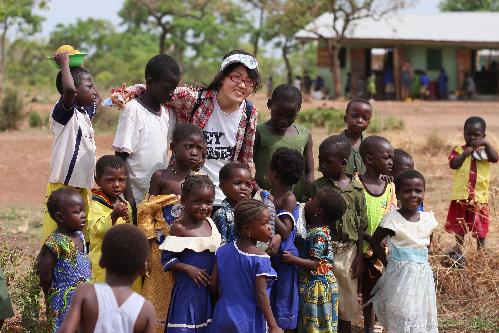|
 |
|
NEW HORIZONS: Zhao Lin enjoys her six weeks in Ghana (COURTESY OF ZHAO LIN) |
I was born in the 1980s. Since childhood, Africa has been a mysterious and remote land in my mind from many viewings of TV programs like Animal World and Man and Nature. Mentions of Africa for years conjured up images of indigenous people expressively worshipping gods in vast grasslands.
Yet, I did wonder what actual life in Africa was like. My generation, the "post 80s" generation, is considered innovative and aggressive by our elders in China. It's unsurprising then that I embarked on a journey to Ghana out of curiosity. For five weeks I worked as a volunteer in an overseas internship project organized by the Association Internationale des Étudiants en Sciences Économiques et Commerciales (AIESEC).
My job was to raise funds to build computer labs for local schools. During my stay, I immersed myself in the local surroundings. In my encounters with African peers also born in 1980s, I was able to note both similarities and differences between young Africans and Chinese.
In most peoples' minds, Africa equates poverty. Yet, after my stay, I found Ghana was not poor at all – at least not in every sense of the word.
Prices for goods in Ghana are as high as in Beijing, but Ghanians, unfortunately, don't live all that comfortably, since almost everything is imported. The scarcity of goods results in high prices and poor quality. Ghanians pay the same price for toilet paper as people do in China, but their paper is of worse quality.
Other economic concerns abound. Ghana is rich in fruits, but they can't be processed into juice until the necessary equipment is imported. This made me wonder if they dislike foreigners who've made it rich in their country. I was wrong.
"If you want to survive in a new environment, you have to know how to make money. It is man's basic need for survival," said Sverash, a local bank manager. "Even when [someone comes] to China, they first need to get familiar with the local environment, and then consider how to take advantage of the local resources to make money. So, they have a business mind," he added.
Ghanians' devotion to Christianity also impressed me. Every morning, my roommate Eunice, a university student, would ask me to pray and read the Bible with her. For Ghanians, going to church is very important. On weekends, shops are closed and people dress up in their Sunday best.
Before Ghana, my idea of church involved a priest telling stories from the Bible. Once there, I was immersed in the congregation's joyful singing and dancing. I participated cheerfully despite not understanding the local dialect.
I think it's probably this spiritual satisfaction that makes some Ghanians not care too much about developing industry. A country's progress cannot only be judged from economic figures; it also depends on people's inner happiness.
Student life in Africa is the same as in China. Girls love going shopping, wearing beautiful clothes and jewelry, and they won't go out unless dressed properly. Ghanian students also burn the midnight oil before an exam, and have laptops filled with favorite movies.
China's family planning policy was a frequent topic during our chats. Most couldn't understand why human life should be regulated by the government. Yet, this policy still had local supporters, such as my co-worker Japhet, a sophomore majoring in finance.
"The family planning policy is great and effective. I think we should follow it, since Ghana also has a large population like China. It will be beneficial for the development of our country," he said.
My cell phone also drew the attention of my Ghanian friends, and they often asked me about its quality and where it was made. In our chats I learned that many of the products they used were made in China, but my friends complained of their low quality. I explained to them that products varied in quality no matter where they are produced, and generally speaking, the higher the price, the better the quality. We came to a consensus after that.
All in all, my Ghana journey gave me a chance to experience and re-examine a land that now makes up my fondest memories. Hopefully, someday I'll be able to go back and meet its kind people again.
The author is a student at the Beijing University of Posts and Telecommunications
|